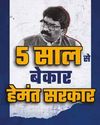
LIKE A DETECTIVE STORY, Jalalul Haq's philosophical work The Shudra: A Philosophical Narrative of Indian Superhumanism begins with a death. Purusha, the creator-god in the "Purusha Sukta" of the Rigveda, is sacrificed in order to create the world. This death is also the myth that legitimises the birth of the caste system, since, according to the hymn, the caste order emerges after this sacrifice. The mouth of Purusha becomes the Brahmin, the arms become the Kshatriya, the thighs become the Vaishya and the feet become the Shudra. "When God was thus killed, and man along with him, caste was born," Haq writes. "With the death of man, the 'casteman' is born, who is not man at all. The caste-man is either higher, superior, or lower, inferior."
A version of this myth, Haq suggests, is to be found at the end of a different tradition, within Western philosophy. In the nineteenth century, the German philosopher Friedrich Nietzsche pronounced "the death of god" in his book The Gay Science. For Nietzsche, this meant that the divinely ordained moral order of Christianity had been undone by the philosophical and scientific discoveries of the Enlightenment. Less than a century later, the French philosopher Michel Foucault argued, in The Order of Things, that man's "death" followed the "death of god." The Enlightenment, he opined, had initially constructed man as the object of the human sciences of anthropology, psychology, linguistics and economics. It was this figure that was supposed to replace the role of god. But for linguistics, the focus on humans as the speaking subject disappeared in favour of language itself. For economics, the relations of production came to occupy a central place, eclipsing man as the producer of commodities. For psychology, man as the thinker of thoughts gave way to the study of mental processes.
Bu hikaye The Caravan dergisinin March 2023 sayısından alınmıştır.
Start your 7-day Magzter GOLD free trial to access thousands of curated premium stories, and 9,000+ magazines and newspapers.
Already a subscriber ? Giriş Yap
Bu hikaye The Caravan dergisinin March 2023 sayısından alınmıştır.
Start your 7-day Magzter GOLD free trial to access thousands of curated premium stories, and 9,000+ magazines and newspapers.
Already a subscriber? Giriş Yap

HOW TO SEE ART?
BN Goswamy's strategies of seeing

Bitter Crop
Ghana's cacao plantations in crisis

SURVEYORS OF DESTRUCTION
An atmosphere of fear persists in the wake of the Sambhal violence

SITE OF DECEIT
HOW THE ASI FORTIFIES HINDUTVA HISTORY

The Broken Pact
Minority legislators rue the erosion of the Constitution under the Modi government/

Hate by Proxy
How shadow accounts on Meta spread BJP propaganda in Jharkhand

Mob Mentality
How the Modi government fuels a dangerous vigilantism

RIP TIDES
Shahidul Alam’s exploration of Bangladeshi photography and activism

Trickle-down Effect
Nepal–India tensions have advanced from the diplomatic level to the public sphere

Editor's Pick
ON 23 SEPTEMBER 1950, the diplomat Ralph Bunche, seen here addressing the 1965 Selma to Montgomery March, was awarded the Nobel Peace Prize. The first black Nobel laureate, Bunche was awarded the prize for his efforts in ending the 1948 Arab–Israeli War.